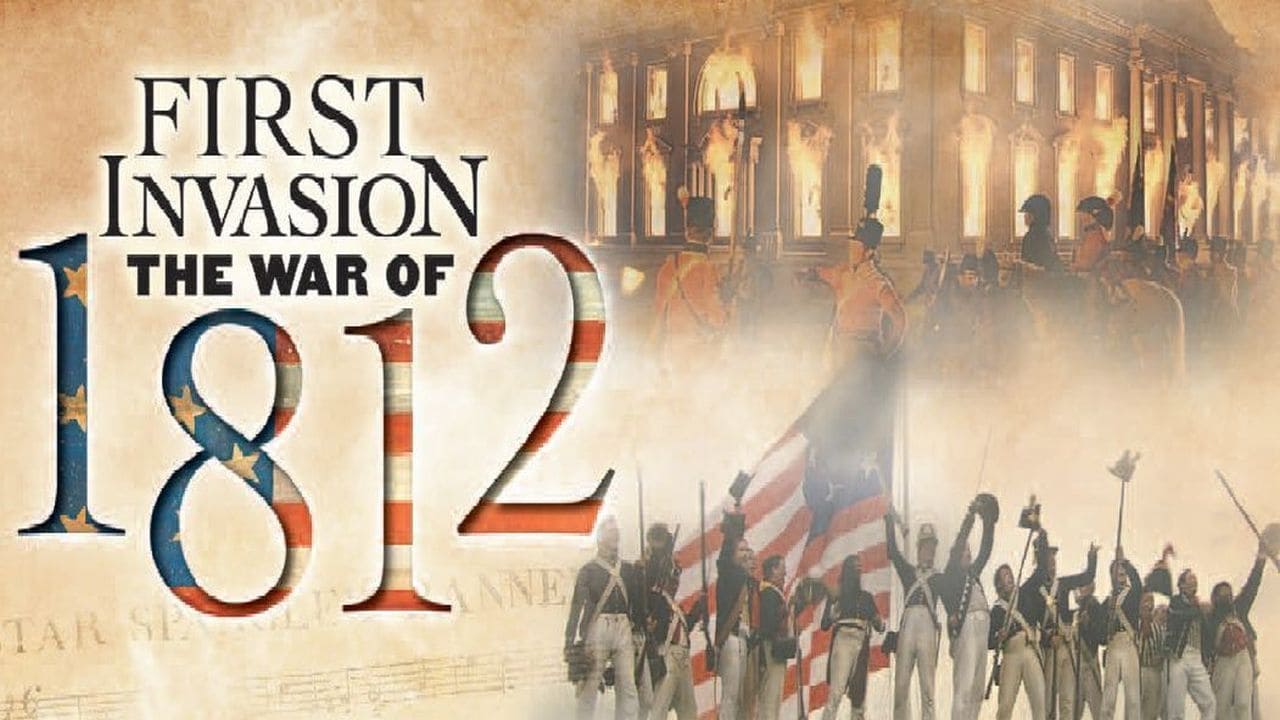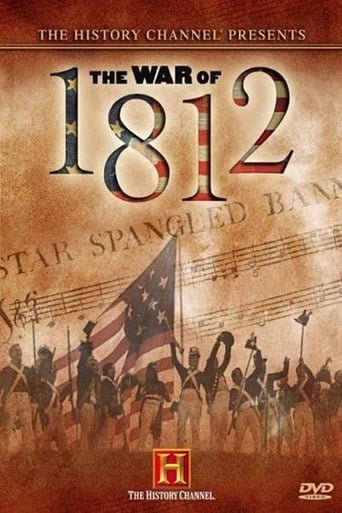

I watched this documentary precisely because of the negative reviews written by the ignorant Canadians on this site. When I read their commentaries, I knew that this documentary would be a valid, compelling, and above all, factual account of the War of 1812. Why? Have you ever heard the idiom, "The truth hurts?" I'd surmise that for the Canadians that watched this documentary, it was the very first time that they came in contact with the facts relating to the War of 1812.Canadian mythos and historical fact are diametrically opposed to one another. During a Canadian child's formative years, he or she mustn't learn that Canada is a feckless, irrelevant, parasitic, kvetching, British colony. To learn this truth would cause unrest in the minds of Canadian society. Who would want to learn that the land they live in is a gross underachiever and a cowardly fence sitter? Nobody would. So the social engineers within Canada have constructed an alternative history that is disseminated to the masses. Agitprops, like the CBC and other media and entertainment outlets, must conform to Canadian content (CanCon) laws. These laws facilitate and encourage purposefully deceitful content to reach the minds of Canadians.What is this alternative history? In a nutshell, anything that would suppress the troublesome truths about Canada. Counterfactual history and historical revisionism related to the War of 1812 is just one of many topics that gets CanCon treatment.The War of 1812 occurred nearly 60 years BEFORE Canada was confederated. Canada was not a belligerent nation during the conflict. The nations that warred with one another were the United States of America and Great Britain. The local populace living in what is now known as Canada were British subjects. Any Canadian militia that fought during the War of 1812 had done so under the Union Jack flag and under British leadership.But what about these local "Canadians?" What was their contribution during the war? Simply put, they had surrendered to the Americans in 1813 during the Battle of York. York had been the capital of the province known as Upper Canada. During that battle, American soldiers had ransacked and burned down Parliament and the Governor's house. Private homes had also been pillaged. After the town razing, the Canadian, colonial government surrendered to the Americans. Canadian militia had surrendered to the Americans, practically without firing a defensive shot. For more information on Canada's specious militia history, google "the Militia Myth." In order to create and bolster Canadian self-esteem, Canadians are taught that Canada did not suffer abysmally during the war, as history informs us. They are even taught to, absurdly, take credit for British victories during the conflict.The United States of America met all of their stated goals during the War of 1812. Great Britain stopped impressing Americans into the British Navy, Great Britain agreed to stop the trade restrictions they had tried to place on America and Great Britain stopped its support of American Indians. For these reasons, the War of 1812 was fought and won by the Americans.This documentary accurately describes this monumental American achievement with clarity. I highly recommend that you watch it. If you're a typical Canadian suffering from Canada's main malady (inferiority complexity), you may squirm in your seat as you watch this documentary. You'll likely get upset at hearing the truth and decide to write a negative review on IMDb. It's the only therapy you'll have because at the end of the day, you still live in a feckless, irrelevant, parasitic, kvetching, British colony.
... View MoreI enjoyed this docudrama. I am now 80 and went to universities for my degrees back in the 1940/50 era. At that time we had more class coverage in history of the early days of the US. I do remember the War of 1812 being covered, but not as much as given in this presentation. Now as I read the comments of the Canadian, it is apparent that his emotions are getting the best of his judgment and feelings for understanding the realities. Of note is the attrition of the forces in the line charging and slaughter of the front rows as they advance. Modern armies would never do that sort of charging, at least not since the British tried charging the German lines that way, almost, in the Great War (known today as World War I). Historical events are now past, emotions for the most part are healed. Taking sides to belittle any part in the events past is ridiculous and will never change what happened.
... View MoreI have read the reviews and as a Canadian I beg to differ in regard to this documentary. No wonder it was never shown in Canada. What do the film makers mean America won the War of 1812 ? You never conquered my country.Consider these facts. In February, 1815 our British forces controlled the District of Maine; Prairie Du Chein in Wisconsin, ( This fort controlled the fur trade on the upper Mississippi and access to the Great Lakes. ), Fort St. Mary along with the town and Cumberland Island, Georgia and Fort Bowyer, Alabama.And how much territory in Canada did American forces control in February, 1815 ? Oh yeah. None.In addition to this the British were effectively blockading all eastern and southern American ports and six American states were considering succession from the Union. ( Hartford Convention. ) Now I want to set the record straight regarding the Battle of Baltimore. You did not give us a Stalingrad ! A small diversionary force of 4,000 British soldiers and sailors took on 12,000 American soldiers who stayed behind their walls of Fort McHenry and in the city while the rockets from the British ships tried to knock the well built walls of the fort down. After 25 hours the British stopped their bombardment and slowly withdrew. The Americans did not pursue us. The British left well satisfied because they knew they had greatly exceeded their original mission which was to take Washington D.C. We had also taken Fort Washington; Alexandria, Virginia; won two battles - Bladenburg and North Point and perhaps best of all, liberated approx. 2,000 black slaves in the Chesapeake area and took them away with us to start new lives as free people in Canada, Bermuda and Trinidad. We also liberated approx. 1,500 more slaves on Cumberland Island, Georgia and more were set free elsewhere. Why didn't the documentary tell the American viewers about all this ? As the Treaty of Ghent, Belgium makes clear, the War of 1812 ended in a draw but the British were clearly winning it.It would be wrong to call the war, America's Second War of Independence as we only intended to take the Territory of Michigan from you to give to Britain's Indian allies as their own permanent land.Finally, what should have been covered by this documentary were all the tens of thousands of American P.O.W's that were imprisoned at Melville Island, Halifax, Nova Scotia, at Dartmoor Prison in England and elsewhere. Believe me, their story needs to be told.
... View MoreI agree with you on a couple of the points you had made, and am very disappointed that the History Channel would make something of such a poor-quality. However I do think that you are a little over-zealous in your patriotic nitpicking of this movie. You may not have meant to do that, but to a uneducated on the subject reader you may come across as a zany Canadien (which isn't all bad). The video states that America is the underdog. You disagree and we must agree to disagree. The War is divided into two sections commonly; the first phase, in which Britain sent a few blockades now and gain but nothing special, and the second phase after the war with he French in which they concentrated all attention on America. Now remember at the time Britain's Navy was the greatest in the world, had the arguably best Army as well. (After defeating one of the greatest military minds of his time in Napolean I agree) Now, because Britain is overseas from the United States, there must have been naval battles out there. Now take in mind that America's Navy at the time consisted of 15 rickety old ships already not in the best of shape after a brief war with Tripoli (spelling?) was all that was mustered, and that the U.S. army was cut by Thomas Jefferson, while the Embargo Act was drastically cutting funds, and Britain had allies in and Native American tribes, so almost it was like 1 on 2 how can you even consider the U.S. to not be underdogs. The country we were attacking was, Canada yes, but it wasn't the only country attacking, and also the British could, and did, reinforce after the war with the French. (Napoleonic Wars) Now your notion that the History Channel claims that America won the war is true, it does, and not at all subtly. But most historians do not agree on the victor. For one, the purposes of the war were expansion into Canada, which failed, so chalk one up for the British. But also it was because of the impressment of American soldiers into British service (By the way, your point on the fact that the British merely requested soldiers be returned to them is somewhat ridiculous, why would British soldiers fight in American armies for one?) Which ceased after the war, chalk one up for America. Also the war was a result of Britain attacking U.S. merchant, which stopped. Chalk one up for America. In my opinion though your best point by far was the one about the Canadians fighting off American forces, and because of this Briain won the War. Props for that. Chalk one up for Britain. So as you see it is undecided. Overall good movie. Also in response to that last paragraph of yours, I do not think that young viewers will think of America being invincible because of the current war in which 1-4 men can destroy cities. (Super-Terrorism is a horrible thing) But also this movie can't be that horrible as you say (in my opinion it was tasteful yet lacking in some areas, mainly informational areas), because it was nominated for a Emmy.
... View More